Primary Literacy App for Skilled Reading
Spellbound helps develop confident readers and flexible learners
Primary English (4–11 years)
Under Development
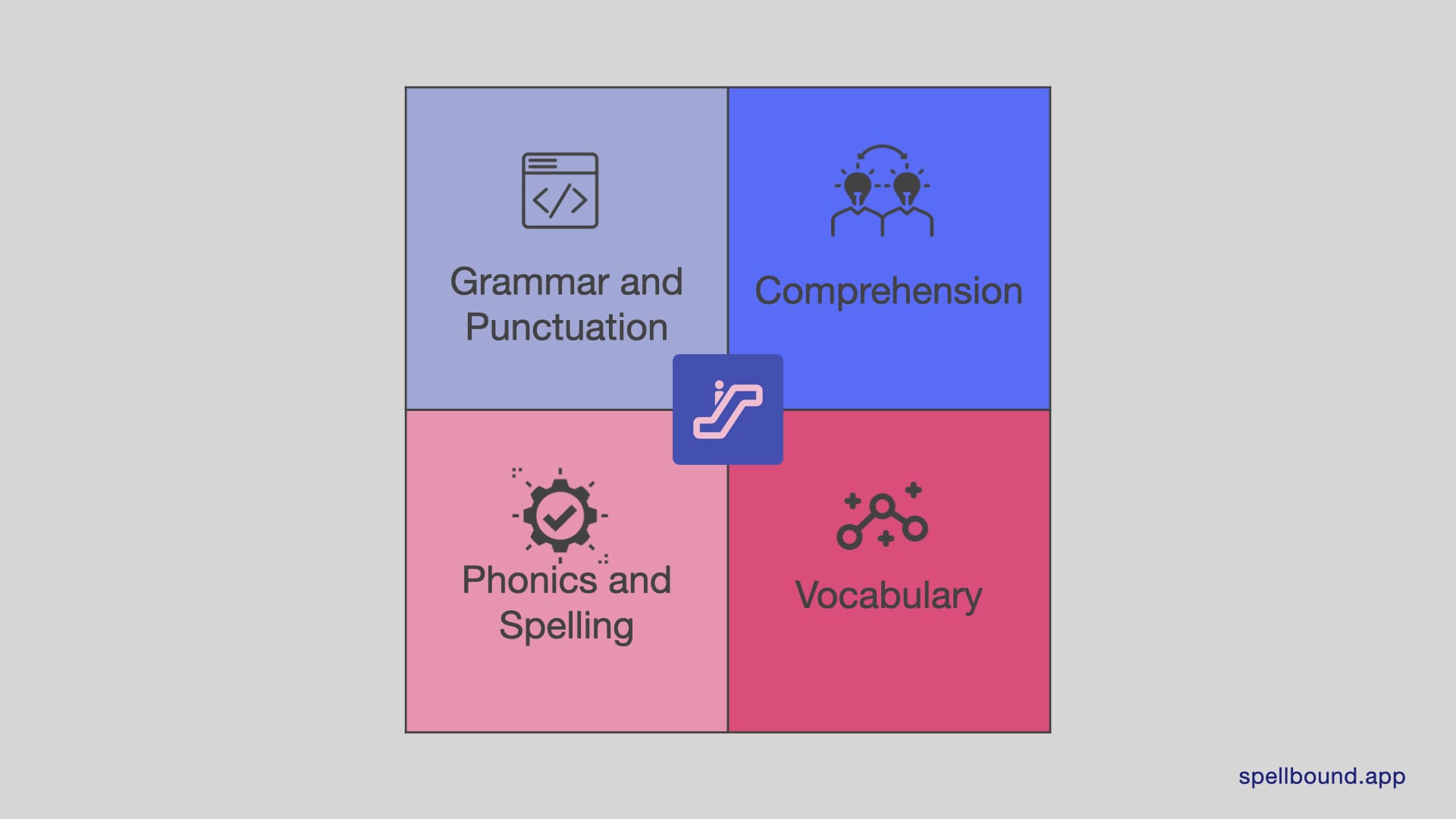
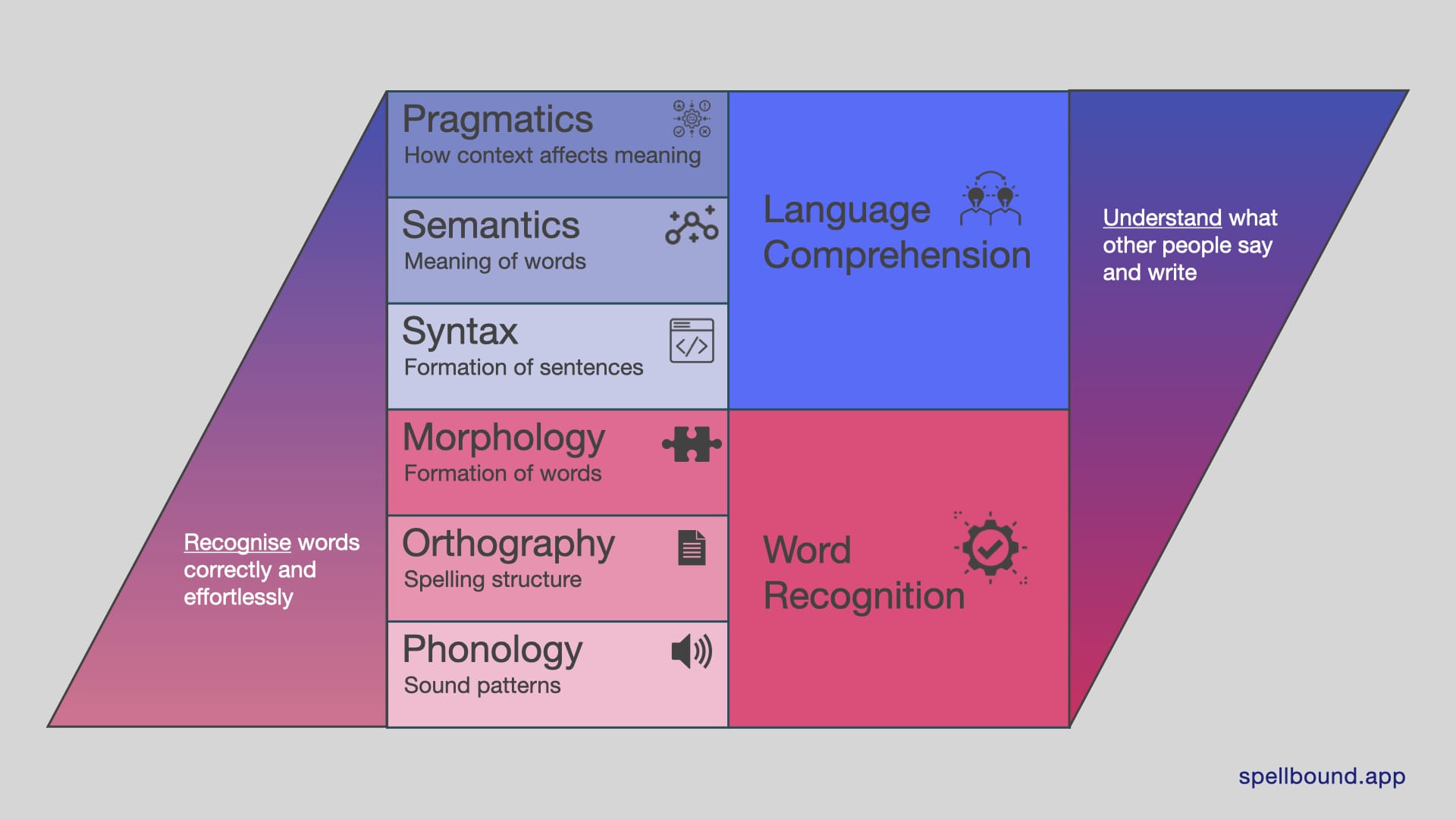
All areas of reading mastery covered
Engaging all three brain processors towards confident sight reading
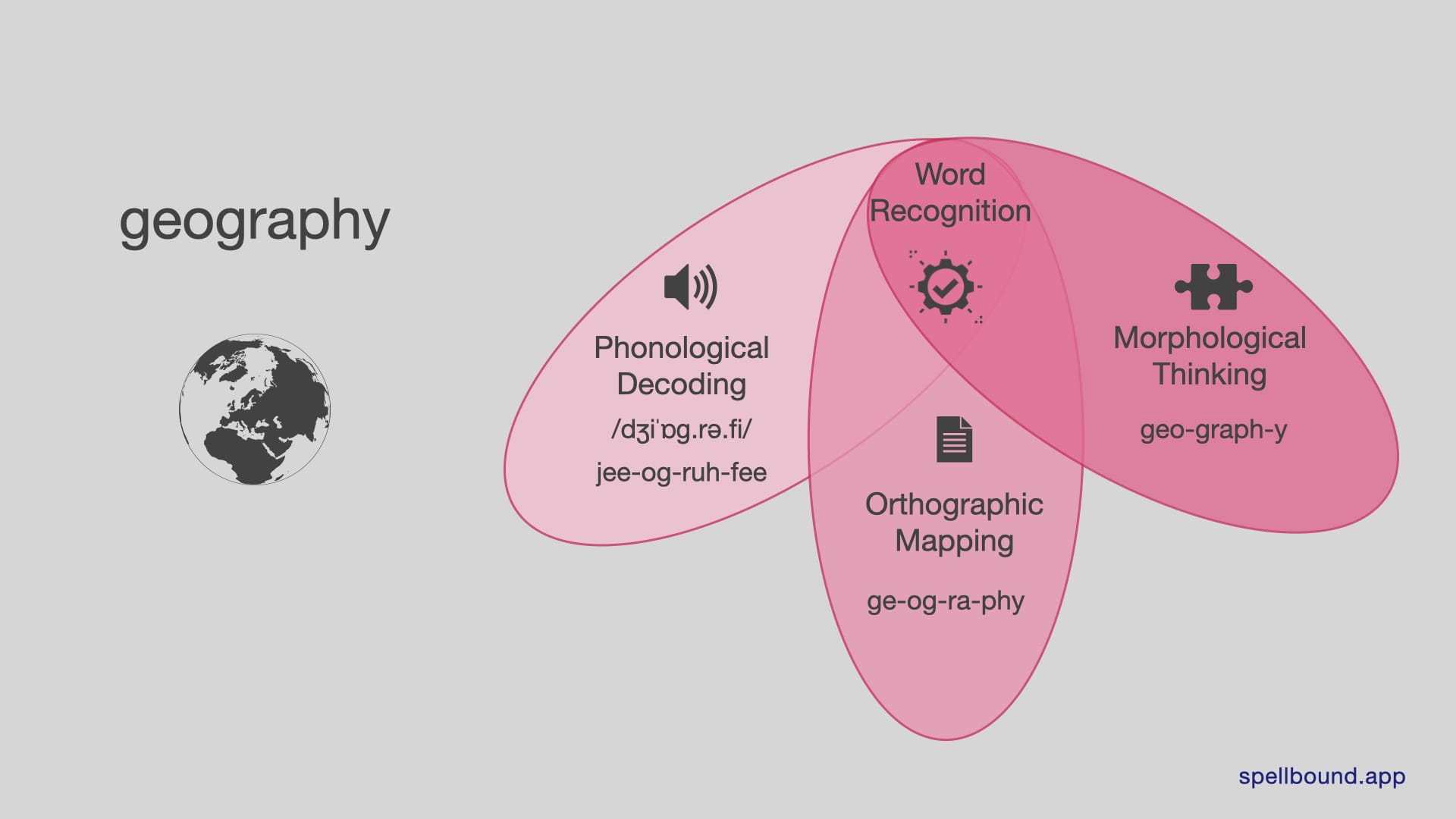
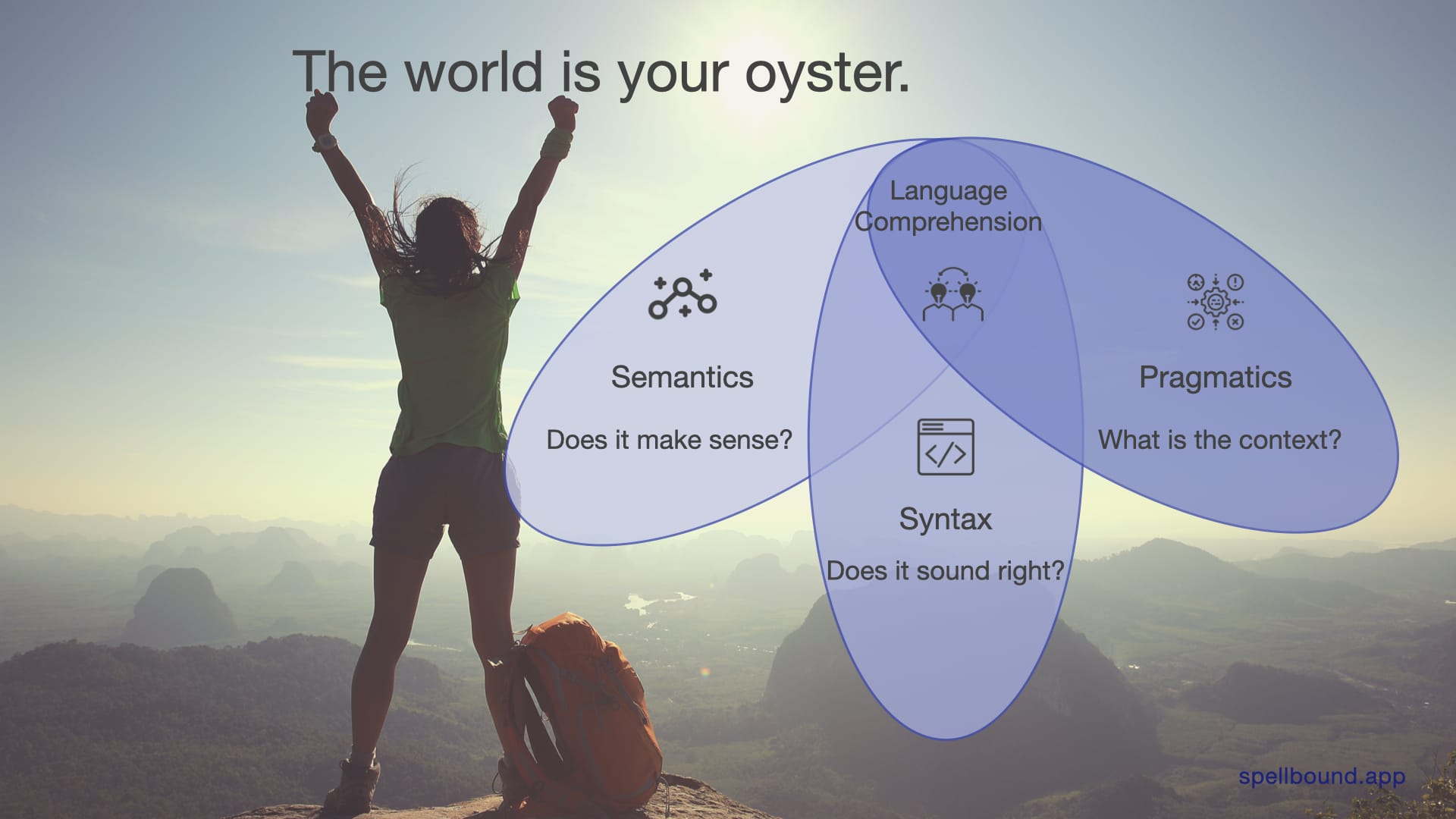
Triangulating content, form and context to build comprehension skills
Adaptive microlearning technology works with your child as an individual
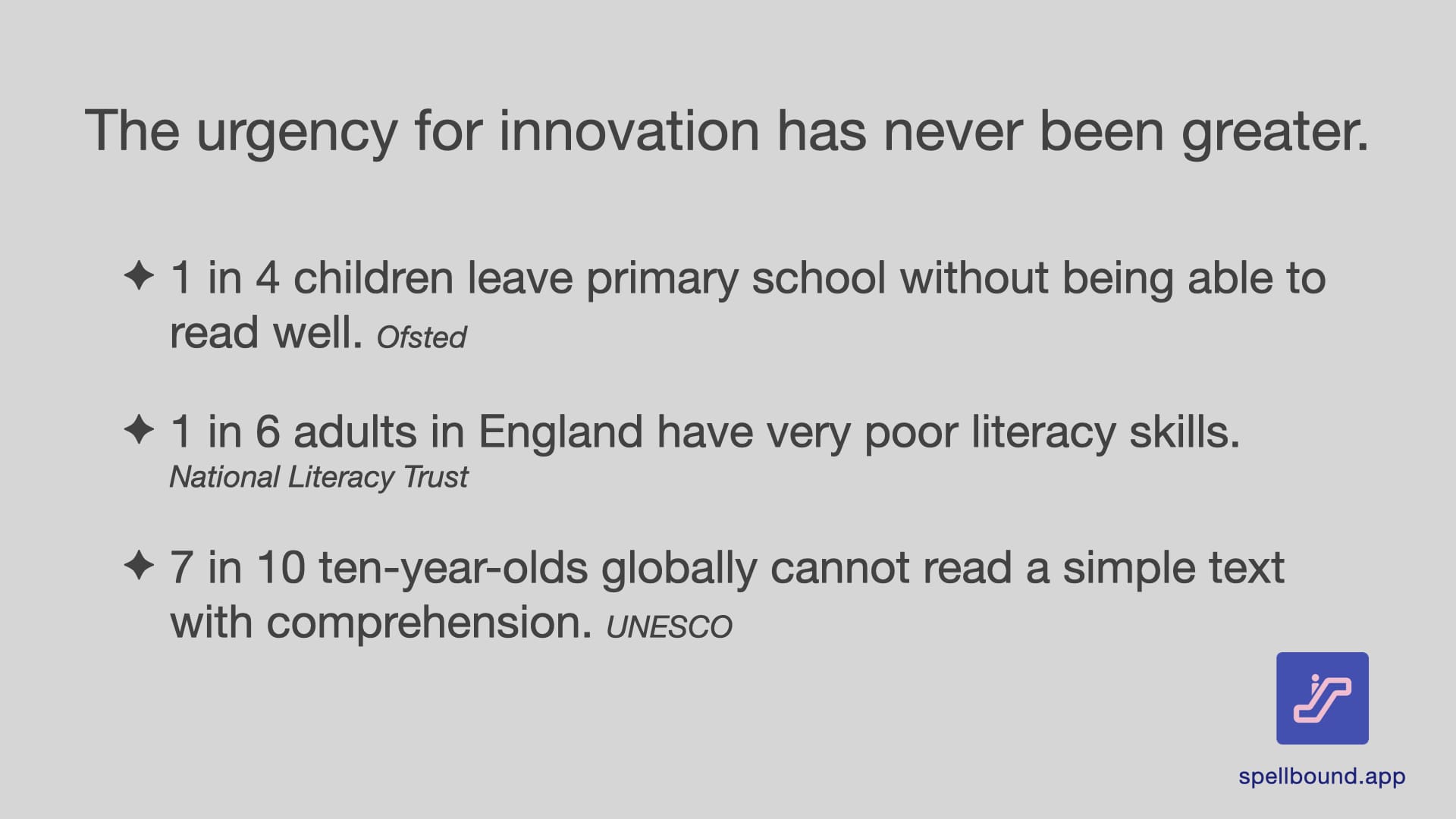
Learners develop through solving context-rich problems covering all areas of the literacy curriculum
Phonics and Spelling
✔︎ Phonemes and graphemes
✔︎ Grapheme-phoneme correspondences in reading
✔︎ Phoneme-grapheme correspondences in spelling
✔︎ High frequency words
✔︎ Common exception words
✔︎ Compound words
✔︎ Homophones and near-homophones
✔︎ Contractions
✔︎ Root words, prefixes and suffixes
✔︎ Syllabic patterns
✔︎ Pluralisation and opposites patterns
Vocabulary
✔︎ Word roots
✔︎ Word families
✔︎ Synonyms
✔︎ Antonyms
✔︎ Shades of meaning
✔︎ Common confusions in word usage
Grammar and Punctuation
✔︎ Nouns and noun phrases
✔︎ Pronouns
✔︎ Adjectives
✔︎ Verbs
✔︎ Past, present and future tenses
✔︎ Subordination and coordination
✔︎ Conjunctions
✔︎ Adverbs and adverbials
✔︎ Prepositions
✔︎ Main, subordinate and relative clauses
✔︎ Active and passive Voice
✔︎ Determiners
✔︎ Connectors
✔︎ Subjunctive verb forms
✔︎ Capitals
✔︎ Apostrophes
✔︎ Brackets
✔︎ Colons and semicolons
✔︎ Commas
✔︎ Dashes and hyphens
✔︎ Full stops, exclamation marks and question marks
✔︎ Ellipsis
✔︎ Speech marks
Comprehension
✔︎ Building cohesion
✔︎ Facts vs opinions
✔︎ Different points of view
✔︎ Themes and main points of a text
✔︎ Inference and deduction
✔︎ Story settings, motives and characters
✔︎ Predicting what happens next
✔︎ Figurative expressions – similes, metaphors, personifications, hyperboles, alliterations, onomatopoeias and idioms
✔︎ Proverbs
✔︎ Analogies
✔︎ Imagery
✔︎ Styles and effects
✔︎ Tone of voice
Spellbound is inclusive – aligned with UK schools years and international grades
Spellbound is inclusive to both classroom teachers and homeschooling parents. All learning levels align with both UK school years, and international grades – so that progression formats for all learners are covered. Each level indicates which years and grades course contents are aligned with.
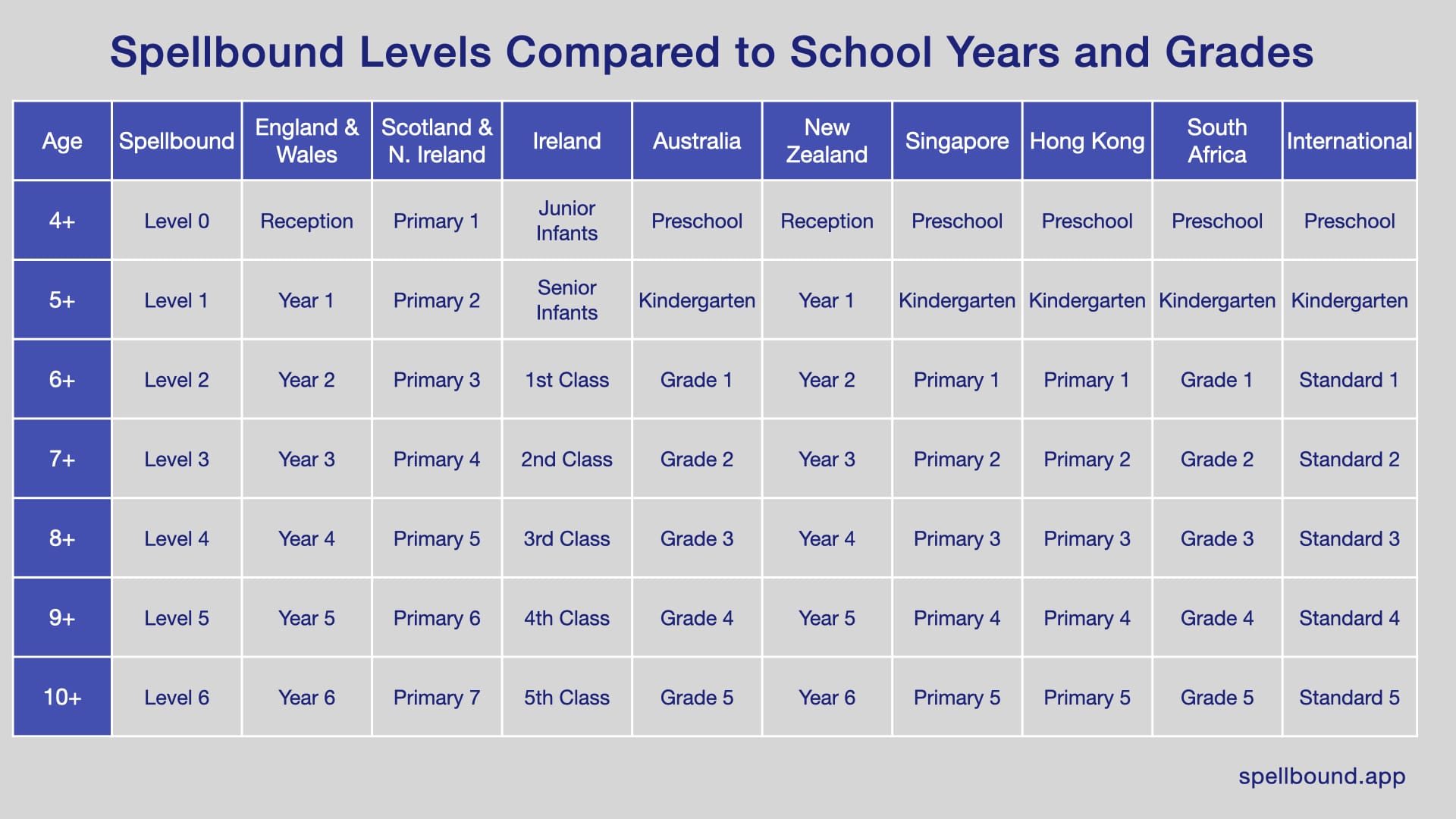
We have a multidisciplinary approach, bringing together innovations in three areas — curriculum design, cognitive science and modern digital technologies
Microlearning is the approach of breaking down learning materials into bite-size lessons that can be more easily absorbed and retained. When incorporated in a modern digital app, it allows learners to get instant feedback and provides instructional help while progressing to more challenging topics. It also facilitates transfer of knowledge from short-term to long-term memory, for better knowledge retention.
Our working memory, where the mind processes moment-to-moment demands, can only deal with around 3 to 5 thoughts at any one time. Microlearning apps can reduce cognitive load on learners by providing easy-to-follow learning roadmaps, user-friendly progress trackers and interactive microlessons with instant feedback that make learning more engaging. We learn faster and more efficiently when our answers are validated or corrected at the exact moment that we are focused on the topic.
Modern microlearning apps deploy cognitive strategies such as instructional scaffolding and retrieval practice. Lessons are designed to provide instructional help or scaffolding at the beginning, which is gradually removed as students progress to more challenging topics. This supports ability-appropriate challenge. In addition, guided review tools support learners to practise retrieving information from memory, strengthening long-term knowledge retention.
With advances in digital technologies, it is now possible for microlearning apps to tailor the learning experience for each user, making learning adaptive, self-paced and autonomous.
Supporting learning at home can be challenging for parents, especially in an increasingly digital lifestyle and home environment. Traditional textbooks and paper-based materials are useful, but they often lack the interactivity and instant feedback today’s children are so used to from their digital experience.
There are vast amounts of free online resources on literacy at the primary level. Yet parents often find them scattered and difficult to navigate through. They do not always engage the learners actively or provide a guided learning path with a clear sense of progression.
The Spellbound app is designed to address these challenges. With Spellbound your child can have easy-to-follow learning roadmaps, user-friendly progress trackers and interactive microlessons that provide instant feedback, making learning more engaging. Your child can learn a lot on their own when their answers are validated or corrected in the moment, while their thought process is still engaged with the problem.
Sometimes learners will get stuck, but this is very much part of their learning journey. We have focused on the part of the learning process that can be digitally aided through thoughtful design, so that you can focus your time on helping develop their mental resilience and coping strategies — vital skills they will need to get unstuck.
Our curriculum development team has done extensive research to ensure the learning outcomes are curriculum aligned and relevant in an international context.
In order to develop the microlessons, we have used lots of visual aids and age-appropriate interactive problem types such as drag and drop, matching images, bucketing, sorting, multiple choice, checkbox grid, and fill in the blanks.
Variations in problem types coupled with extensive visualisation ensure the learning experience is both engaging and challenging.
Spellbound.app is designed as a PWA (progressive web application) which is cross-platform, responsive and installable.
When installed, Spellbound delivers a user experience similar to native apps on supporting platforms such as Windows, Linux, macOS, Android and iOS.
To install on desktops or laptop computers, start Google chrome and navigate to https://spellbound.app. On the right side of the address bar there will be an installation button (+). Click on it and install.
The app supports all modern browsers and devices, automatically adapting to the screen size whether it is a desktop, laptop, tablet or smartphone.
Onyx is a guided review tool available for the learners. As they progress through or finish a level, they can use Onyx to review the materials in short bursts of guided practice. Onyx will guide them through each level, spending more time on units they still find challenging and less on units they’ve already mastered.
The Spellbound app and Onyx are powered by Qognitive, a proprietary technology stack developed by our digital products lab. Qognitive is a modern technology stack which is scalable, cross-platform and AI-enabled, designed to exploit the full potential of adaptive learning and educational big data analysis.
Please send a short note to hello@spellbound.app expressing your interest and we will be in touch.
Technology should be a key consideration for 21st century literacy education, from generating cognitive-based resources to bringing modern-day context into the classroom.
We are particularly interested in collaborating with visionary schools who want to participate in our product development roadmap and tailor the app to their requirements.
We are a UK-based Registered Learning Provider (UKRLP No 10088434).
Our app design principles are guided by the Children's Code, also known as the Age Appropriate Design Code, and the 15 standards that online services need to follow.
We are registered as a data controller at the UK Information Commissioner’s Office under ZB029785. We will at all times comply with the UK General Data Protection Regulation in respect of our collecting, processing and protecting your personal data.
The app does not store any financial information from members’ accounts. We rely on our payment services provider Stripe for processing membership fees and providing account financial information.
Stripe is certified to PCI Service Provider Level 1, the most stringent level of security certification available in the payments industry.
Spellbound builds on our innovative maths app Outnumber
